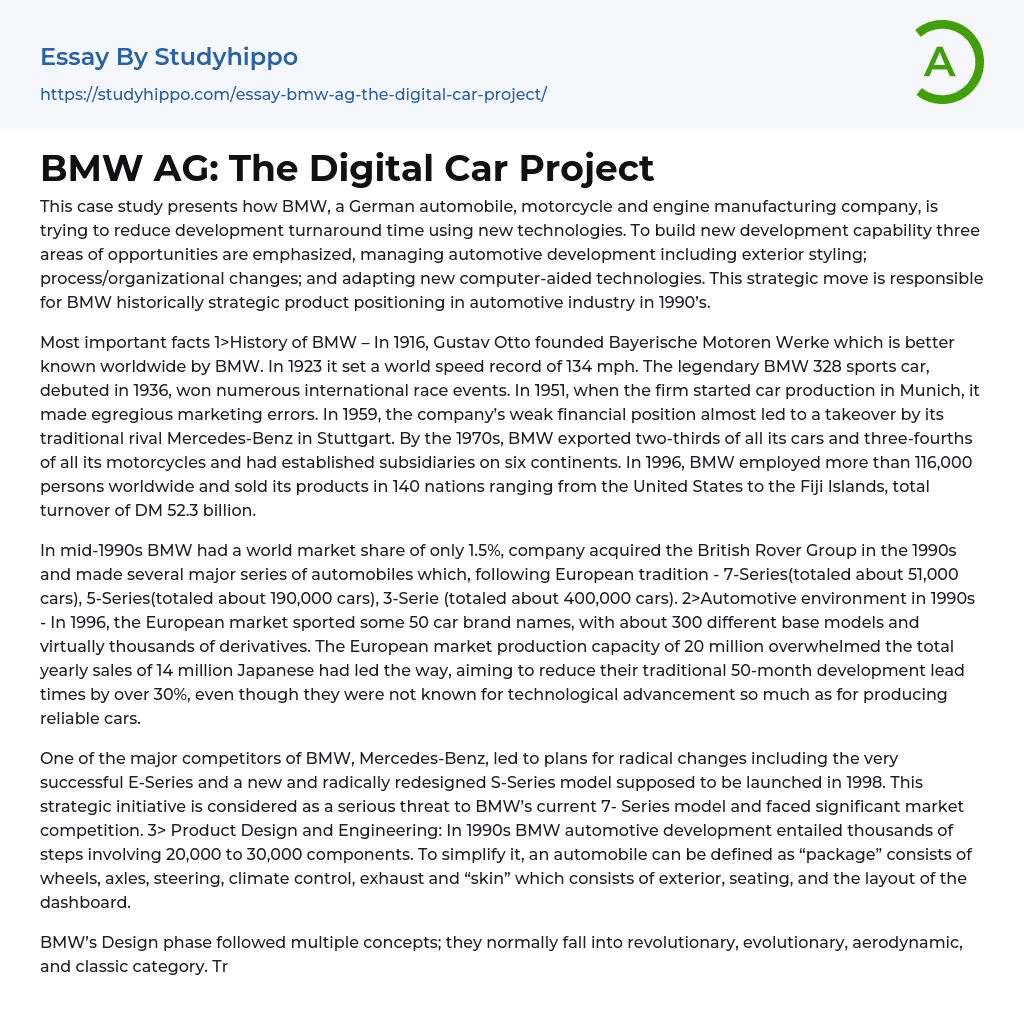This case study presents how BMW, a German automobile, motorcycle and engine manufacturing company, is trying to reduce development turnaround time using new technologies. To build new development capability three areas of opportunities are emphasized, managing automotive development including exterior styling; process/organizational changes; and adapting new computer-aided technologies. This strategic move is responsible for BMW historically strategic product positioning in automotive industry in 1990’s.
Most important facts 1>History of BMW – In 1916, Gustav Otto founded Bayerische Motoren Werke which is better known worldwide by BMW. In 1923 it set a world speed record of 134 mph. The legendary BMW 328 sports car, debuted in 1936, won numerous international race events. In 1951, when the firm started car production in Munich, it made egregious marketing errors. In 1959, th
...e company’s weak financial position almost led to a takeover by its traditional rival Mercedes-Benz in Stuttgart. By the 1970s, BMW exported two-thirds of all its cars and three-fourths of all its motorcycles and had established subsidiaries on six continents. In 1996, BMW employed more than 116,000 persons worldwide and sold its products in 140 nations ranging from the United States to the Fiji Islands, total turnover of DM 52.3 billion.
In mid-1990s BMW had a world market share of only 1.5%, company acquired the British Rover Group in the 1990s and made several major series of automobiles which, following European tradition - 7-Series(totaled about 51,000 cars), 5-Series(totaled about 190,000 cars), 3-Serie (totaled about 400,000 cars). 2>Automotive environment in 1990s - In 1996, the European market sported some 50 car brand names, with about 300 different base models and virtually thousands of derivatives
The European market production capacity of 20 million overwhelmed the total yearly sales of 14 million Japanese had led the way, aiming to reduce their traditional 50-month development lead times by over 30%, even though they were not known for technological advancement so much as for producing reliable cars.
One of the major competitors of BMW, Mercedes-Benz, led to plans for radical changes including the very successful E-Series and a new and radically redesigned S-Series model supposed to be launched in 1998. This strategic initiative is considered as a serious threat to BMW’s current 7- Series model and faced significant market competition. 3> Product Design and Engineering: In 1990s BMW automotive development entailed thousands of steps involving 20,000 to 30,000 components. To simplify it, an automobile can be defined as “package” consists of wheels, axles, steering, climate control, exhaust and “skin” which consists of exterior, seating, and the layout of the dashboard.
BMW’s Design phase followed multiple concepts; they normally fall into revolutionary, evolutionary, aerodynamic, and classic category. Traditionally BMW worked with clay model in 1990’s at design phase followed refinement process. This process required laser scanners to “digitize” information but it was comparatively slow process. The design models could be made available to engineering in the form of computer-aided design (CAD) and Computer-aided styling (CAS) models. A major advantage of working digitally was parallel development with engineering and it also allows direct data links to computer-aided design (CAD). After exterior design was complete, the CAD data moved to Andreas Weber’s group in body engineering.
The Evolution of Product Development at BMW
The old process: 72-month-long process dominated in 1970’s and 1980’s.
There were 3 major prototyping cycles in this process. A high-quality physical prototype could exceed one million dollars and often required months of superb craftsmanship. Ex: BMW 5-Series was developed under this development process.
The current process: In 1990s a development process was entailed which is 60-month-long. Two major prototyping cycles first time started to take advantage of rapidly emerging computer simulation methods and to identify potential design problems earlier in the development schedule. Computer-aided technologies remained untapped in the current process. Ex: BMW 3-Series, launched in 1998, was developed under this development process.
Reengineering Automotive Development: To stay competitive and decrease the turnaround time of the development process BMW had to launch a reengineering task force who was responsible for meet a bold target of for slashing product development time by 50% percent . Task force identified five key process areas—body, climate control, fuel supply, test engines (power train), and acoustics—that accounted for about 90% of the critical processes in the product development timeline and decided to change the traditional process to increase productivity – 1> Increased parallelization of design tasks, 2> Elimination of some design iterations, 3> Quicker completion of the remaining design iterations.
- Renault essays
- Truck essays
- chrysler essays
- The city essays
- Racing essays
- Genetic Engineering essays
- Bus essays
- Internal Combustion Engine essays
- Hybrid essays
- Electric Car essays
- Invention essays
- Mechanics essays
- Innovation essays
- Telephone essays
- Software Engineering essays
- Automobile essays
- Cycling essays
- Civil engineering essays
- Mechanical Engineering essays
- Bentley essays
- Adidas essays
- Amazon essays
- Apple essays
- Bmw essays
- British Airways essays
- Burger King essays
- Coca-Cola essays
- Company essays
- Costco essays
- Dell essays
- Ebay essays
- Enron essays
- Facebook essays
- Ford Motor Company essays
- Gap essays
- General Motors essays
- Google essays
- Honda essays
- Ibm essays
- Ikea essays
- Intel essays
- Iphone essays
- Johnson and Johnson essays
- Kellogg essays
- Key essays
- Kfc essays
- Mcdonald's essays
- Microsoft essays
- Myspace essays
- Nestle essays




